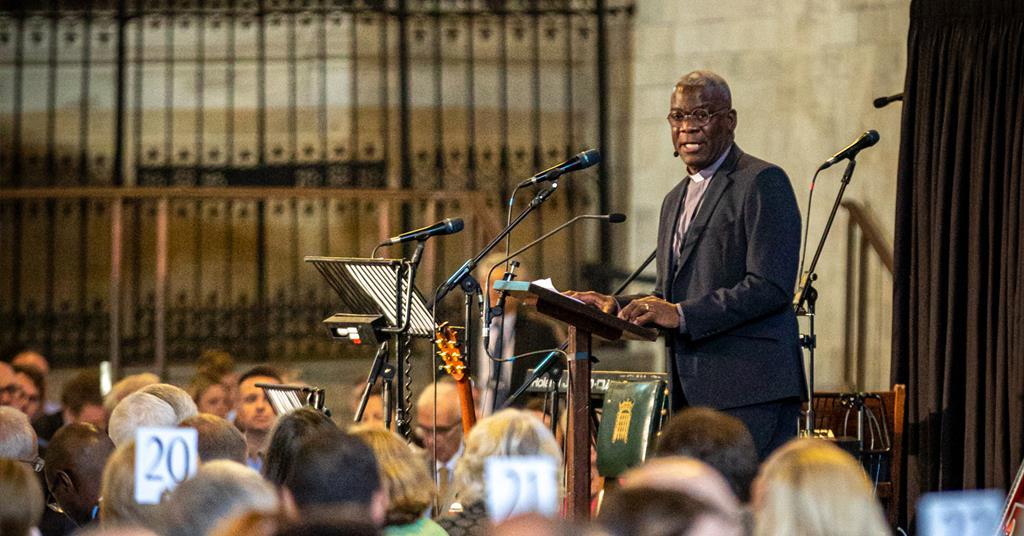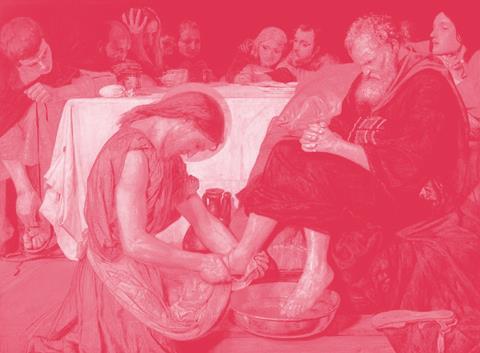The prayer meeting that overthrew a government? | Magazine Features

Recently I had the privilege of leading worship at the now infamous Parliamentary Prayer Breakfast in Westminster Hall, Parliament. As I walked home that evening, I could still feel the aftereffects of God’s overwhelming presence in that room.
I knew that something powerful had happened but, at that time, I did not know how the seismic events of the next few days would unfold.
That morning, I had pointed out to those gathered that it is not common to sing “The angels from the heights adore him” while angels, carved into the magnificent roof of the hall, look at you.
The sculptures were placed there to remind everyone working in parliament where the ultimate authority lies. It seemed like more people than ever were glimpsing this truth. It was the largest number of parliamentarians (190) we have ever had at breakfast.
During the anthem “We Seek Your Kingdom,” they sang, “Peace, truth, and justice reign everywhere / With us be present in our public square / Fill all who rule with your integrity / Transform, revive, and heal society”.
Never had these words seemed so relevant to me. Later, after Rev. Les Isaac’s moving sermon, we led a time of reflection and response inspired by Lucy Clasper’s prophetic cello playing. There was a tangible electricity in the room. (Watch live video for yourself here.)
This led us to sing an unplanned song over the crowd, as we felt there was so much pain, damage and division that needed God’s healing: our hearts / In your love.
More than a few MPs told me afterwards that it was the first time in years that they had time to stop, turn off their phones, breathe and reflect in the midst of beauty.
It’s amazing what happens when you kneel before the know-it-all. You realize that you don’t know everything, and even with an ounce of humility, remarkable things can happen – as Sajid Javid can attest.
A few hours after breakfast, he handed in his resignation, telling the BBC: “I made my decision then, sitting there listening [Rev Les Isaac’s] sermon, and I just thought, it’s a matter of integrity, it’s a duty. If you don’t trust the boss, you owe it to yourself and the country to kindly tell the boss that you can’t serve and that’s it.
However, we shouldn’t be naive and buy into the pantomime villain narrative about Boris Johnson. This is not the time to shout (or cry) but the time to be encouraged by this change to keep praying and offering yourself.
Let’s not forget that this is a story of collective ethical failure. And before pointing the finger too much, let’s remember, as the 18th century philosopher Joseph de Maistre so aptly put it: “Every nation has the government it deserves”. It is a moment of humility on all of us.
In the image of God
The Church does not have a monopoly on integrity, as part of our recent and past history clearly demonstrates. Admitting our mistakes is a prerequisite for humility.
The theological idea of Imago Dei from Genesis 1 reminds us that we are all made in the image of God, destined to reflect him in the world: “So God said: ‘Let us make man in our image, according to our likeness’ (vv26-28, NET).
This is true whether we are believers or not. Quite simply, if we are made in the image of God, we are called to rule because he rules. And we are called to do so in a way that represents him in the world.
If you think your leadership position is part of a sacred calling to represent the divine image, rather than something you deserve because of your education, skills, or intelligence, you are more likely to maintain it. in its place. There is a greater chance of integrity and accountability; to enter into the kind of leadership that Jesus modeled.
We are told in John 13 that our savior was fully aware of the power he wielded: “Jesus knew that the Father had put all things under his power, that he had come from God and was returning to God” (v3 ). If I had such incredible power, I would do everything possible to right the wrongs and put everything back in order immediately.
But listen to how Jesus used his power: “…then he got up from the meal, took off his outer garments and wrapped a towel around his waist. After that, he poured water into a basin and began to wash the feet of his disciples” (v4-5). The word “therefore” is essential. The word is not “despite”. The very awareness of his power was what moved Jesus to serve.
It was not a leave of the divine nature to enter into relationship with the “little people”; it was the divine nature fleshed out for all to see. It was the Almighty God who stooped to become a servant. It was the opposite of “one rule for us and another for them”.
In fact, the word “integrity” comes from the same root as the term “integer”, which means a “whole number”.
A whole is not a fraction, nor divided into parts. This “integrity” expresses the feeling that we should be the same in all situations, not divided into parts, appearing one way to one person, but another way to someone else.
ethical issue
In the run-up to US elections, Christians have sometimes used the phrase, “We elect a president, not a pastor” to justify electing politicians whose private – and public – lives seem ethically questionable.
But, as we have seen time and time again, we cannot separate ethics and integrity from leadership. Don’t we want our business, sports and political leaders to adhere to the highest principles and not just “get the job done”? Leaders set the tone for a company, church, or country through their conduct as well as through their legislation.
A misreading of one of Jesus’ famous responses to the Pharisees did not help our mistaken division between sacred and secular: “Render unto Caesar what is Caesar’s and render unto God what is God’s” (see Mark 12 :17).
It’s too seductive to relax in the simplicity of letting Caesar take care of taxation, broadband, and trash collections, while God takes care of prayers, hymns, and unseen things. But these are not two separate areas. Jesus was saying that Caesar has a small area of delegated authority within God’s overall authority.
It was clear that Pilate would have no authority other than that which was “given…from on high” (John 19:11). Jesus affirmed human authority while reminding us where it ultimately comes from, just like those angels in the roof. While he has authority over the unseen and the visible, it’s pretty clear that he cares about how things are done as well as what is done.

The scales are falling
For many years, as I preached at various Christian events and festivals, my work in politics often elicited the response, “It’s great that you’re involved, Andy, but these politicians – they’re all the same – that it doesn’t matter who we vote for.
But not too many people say that now. Amid Brexit, Covid and Partygate, it has become very clear that it doesn’t matter who is in charge. The impact of political decisions on our individual lives has shifted from abstract to close and personal.
Previously, independent people have been told to “stay at home”, or that certain travel options (and even food items) are not readily available. It underscored the importance of thinking carefully about who we elect and whether people like us should get involved in trying to improve the political gene pool.
For years, something told us that integrity should be important in our leaders. But the logic of: “If they get the economy right / do Brexit / solve climate change, I don’t care what they do in their private lives” has often dominated. We have timidly put aside these reflections on integrity.
Then a crisis erupted. When a government makes life and death decisions on our behalf, we need to be able to trust it. In any relationship, trust is built through an accumulation of promises kept and truths told.
As some world leaders have discovered, if you develop a reputation for doing the opposite, then when you need to communicate something very important (and possibly unpleasant), the wheels come off. Of course, the reality is that governments always make life and death decisions, but for many of us, our relative prosperity insulates us from the impact of those decisions.
If you look at the biographies of past prime ministers, you will see that it was not policies or manifestos that defined their legacy, but how they responded to world events. Margaret Thatcher and the Falklands War, Tony Blair and weapons of mass destruction, David Cameron and Brexit. Seeking divine policies simply will not suffice. We need humble people with integrity in the hot seat. Character matters.
good leadership
We need leaders who are not distracted by the noise of Twitter, the lure of the City of London or other vested interests. We need leaders who could just look to the scriptures.
We need leaders who value truth so that when they look us in the eye and tell us something we don’t want to hear, we can believe our sacrifice is for the greater good.
We need leaders who treat the people around them with respect and empathy because they are much more likely to lead the nation with the same attitude. Let us never again enter into the illusion that the private and the public are disconnected domains.
In short, we need leaders with integrity. And, at Christians in Politics, we wonder if you could be one of them. As believers, we are not perfect, but we have constant access to someone who keeps us humble and shows us a better way.
As church members, we learn incredible public speaking and organizational skills. As actors involved in community projects, we often know better than anyone the challenges of our communities. And I often see the Holy Spirit giving people an “X-factor” that sets them apart from the crowd.
Come join us. It won’t be quick and it won’t be easy. But your faith will be stretched and you may well see miraculous things happen. What happened at the recent prayer breakfast in parliament should strengthen our faith and convince us that more miracles will be possible when our standing before God is right.
We are called to follow Jesus as image bearers of the great leader. We won’t necessarily succeed for him (although we pray for that too!), sometimes it will feel like a defeat. But if our metric is what Genesis 1 calls for, rather than just “getting things done,” we might be okay with that.
There is nothing more annoying than when people point fingers, calling on others to show more integrity and humility. But there’s nothing more beautiful than people wrapping napkins around their waists and getting stuck in to serve.






